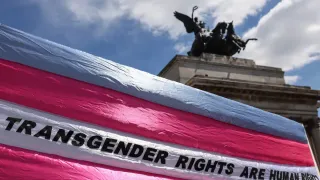
3 hours ago
Young Republican Leaders Exposed for Racist and Sexist Messages in Leaked Telegram Chat
READ TIME: 3 MIN.
A months-long investigation by Politico has uncovered a trove of deeply disturbing messages exchanged among leaders of Young Republican organizations across multiple states, revealing a pattern of racist, antisemitic, and sexist commentary that the participants themselves feared would be exposed to the public.
The leaked Telegram group chat, spanning over seven months and containing thousands of messages, included elected leaders from Young Republican state organizations in New York, Kansas, Arizona, and Vermont. These individuals, despite the organization's name, are adults ranging in age from 18 to 40 years old who hold leadership positions within a prominent Republican youth political organization that claims approximately 15,000 members nationwide .
The nature of the leaked messages reveals language and sentiments that cross well beyond typical political discourse into explicitly hateful territory. According to Jason Beeferman, New York state politics reporter for Politico who co-authored the investigation with colleague Emily Ngo, the chat participants used dehumanizing slurs to refer to Black people, calling them "monkeys" and "the watermelon people" .
The messages also contained extreme antisemitic content and discussions expressing admiration for Adolf Hitler, with some participants discussing "the love of Hitler with factions of their party." Perhaps most disturbingly, the group chat included messages characterizing rape as "epic" and expressions of support for slavery .
Notably, when confronted with the reporting, none of the individuals involved disputed the validity or authenticity of the messages. According to Beeferman's account during his CBS News interview, "No one told you,'Oh, that didn't happen.' They've all agreed that this is what happened and these are real" .
What makes this revelation particularly significant is not just the content of the messages, but the position of those exchanging them. These were not random party members or anonymous internet commenters, but elected leaders within their respective state Young Republican organizations who were actively campaigning to lead the national organization. Their prominence within the Republican youth movement suggests these attitudes may have broader reach and influence than isolated incidents of individual prejudice .
The journalists behind the investigation sought to understand not just what was said, but why these leaders felt comfortable expressing such views to one another. Beeferman noted that the investigation examined"why are they speaking like that to each other and does this have anything to do with kind of the way that the norms of our political discourse have been changing, some would say since President Trump came to power" .
The messages were exchanged on Telegram, an encrypted messaging platform that offers greater privacy than many mainstream social media platforms. The use of such a platform, combined with the participants' own expressed concerns about the messages being leaked, suggests awareness that their comments would be considered unacceptable if made public. This raises questions about the disconnect between public political personas and private beliefs among some political leaders .
Youth political organizations have traditionally served as training grounds for future political leaders and as mobilization forces for their respective parties. The Young Republicans, founded in 1931, has produced numerous politicians who went on to prominent careers in Republican politics. When the leadership of such organizations engages in extremist rhetoric, it raises concerns about the values and norms being transmitted to the next generation of political actors.






